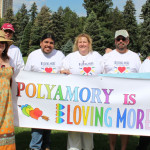With its appearance before the British Columbia Supreme Court approaching, the Canadian Polyamory Advocacy Association presented a workshop titled “The Canadian Charter Rights Case and Criminalization of Polyamorous Households” in October at Loving More’s Poly Living conference in Seattle.
CPAA, with members across Canada, formed to advocate before the court as an “intervener” (interested party) representing polyamorists’ interests in a historic trial that begins November 22nd in Vancouver.
Canada has a federal law, Section 293 of the Criminal Code of Canada, that specifies five years in prison for people in both polygamous and “any kind of” group conjugal situation -- criminalizing polyamorous homes in which more than two adults are living together as if they were married -- even, the law specifies, if they are not having sex.
The Attorney General of British Columbia recently attempted to enforce this law with regard to a fundamentalist patriarchal polygynous community called Bountiful, and was unsuccessful. He has requested that the British Columbia Supreme Court rule that Section 293 is consistent with the Canadian Charter of Rights and Freedoms and therefore constitutional. Canada’s federal Attorney General has also joined this case with the intent of making this law prosecutable. The court has appointed an Amicus to coordinate the “interested parties” who would speak to the matter. CPAA is one of those.
Section 293 reads as follows:
------------------------------------------
(1) Everyone who
(a) practices or enters into or in any manner agrees or consents to practice or enter into
(i) any form of polygamy, or
(ii) any kind of conjugal union with more than one person at the same time,
whether or not it is by law recognized as a binding form of marriage, or
(b) celebrates, assists or is a party to a rite, ceremony, contract or consent that purports to sanction a relationship mentioned in subparagraph (a)(i) or (ii),
is guilty of an indictable offence and liable to imprisonment for a term not exceeding five years.
Evidence in a case of polygamy
(2) Where an accused is charged with an offence under this section, no averment or proof of the method by which the alleged relationship was entered into, agreed to or consented to is necessary in the indictment or on the trial of the accused, nor is it necessary on the trial to prove that the persons who are alleged to have entered into the relationship had or intended to have sexual intercourse.
R.S., c. C-34, s. 257.
---------------------------------------------
The first version of this law was enacted in 1890’s with a sub-clause specifically directed at Mormons. There have been few charges laid under this law and even fewer convictions, but it has been used to assimilate aboriginal people and limit polygamous immigration.
In today’s Canada, there is increased interest in and growing acceptance of multiple-partner relationships among a very different population: modern, mainstream, egalitarian secularists, often with a feminist orientation, motivated by values of love, mutual respect, and self-determination. The response of government has been generally neutral, but the law does criminalize polyamorous households and contributes to fear in our community. Our political organization so far has been minimal with regards to our rights.
In recent years there has been much media coverage and social pressure to prosecute alleged abusive behavior at Bountiful, a community of Fundamentalist (originalist) Mormons. This group first immigrated to Canada in the 1860s and has ties with the FLDS Church of Warren Jeffs in the United States. Its members are polygynous (encouraging “celestial marriages” of one man to several wives but forbidding the reverse) and highly patriarchal, with a loyalty to the prophet above all else. In this isolated community allegations have surfaced of abuse, exploitation of girls, lack of true consent to early sex and marriage, limited and racist education, excess male “lost boys” expelled from the community, and abuse of the government social safety net. The RCMP (federal police) have been investigating these allegations since 1990 but have not prosecuted, reportedly because the community is effectively closed off to outside intervention.
 Many former inhabitants have testified to authorities and the media about such abuses at Bountiful. In 2009, charges were laid by the BC government against Bountiful leaders Warren Blackmore and James Oler under the polygamy law, but the charges were thrown out due to abuse of process.
Many former inhabitants have testified to authorities and the media about such abuses at Bountiful. In 2009, charges were laid by the BC government against Bountiful leaders Warren Blackmore and James Oler under the polygamy law, but the charges were thrown out due to abuse of process.
The media coverage of Bountiful has created a context that colors the public’s ability to “see” polyamorists – a completely different population that is “collateral damage” of the overly broad anti-polygamy law. The CPAA has a mission to distinguish polyamory from the practice of patriarchal polygyny for the court and the media. We seek decriminalization and recognition that there are many relationship configurations criminalized by this law that are not patriarchal polygamy.
Groups acting as “interested parties” to present the position that the law is constitutional are Stop Polygamy in Canada, West Coast Legal Education Action Fund, British Columbia Teachers Federation, REAL Women of Canada, Beyond Borders – Ensuring Global Justice for Children, Christian Legal Fellowship, and The Canadian Coalition for the Rights of Children & David Asper Centre for Constitutional Rights.
The parties in favour of the law have proposed that the law is constitutional if interpreted narrowly so that a “conjugal relationship” must be sanctioned by an influential authority and must be binding. The claim is made that multiple relationships of two men and one women, and same-sex multiple relationships, are not “polygamy” and not intended to be prohibited by the law as they are not contributory to the same social harms. The law’s supporters also propose that despite the law’s clear language to the contrary, it is constitutional if “read down” to mean only situations involving a minor or occurring in a context of dependence, exploitation, abuse of authority, a gross imbalance of power, or undue influence. The harms noted are an overall negative social effect (a few men get all the women and the single men are left to run amok), abuse of women and children, women’s lack of equality rights in choice of mate(s), and international obligation to ban polygamy under human rights treaties and an inconsistency with Canadian moral values.
The CPAA is among the interested parties that will present the position that the law is unconstitutional and breaches Charter rights, including freedoms of conscience, religion, association, and rights to equality, as well as life, liberty and security of the person (due to the law’s vagueness and breadth). Other groups arguing against the law are the Fundamentalist Church of Jesus Christ of Latter Day Saints (FLDS) & James Oler, Bishop; the BC Liberties Association, and Canadian Association for Free Expression, as well as the Canadian Polyamory Advocacy Association.
This law is widely considered to be unconstitutional as written. The CPAA is proposing that consensual, egalitarian polyamorous relationships, including conjugal relationships, are equal in value and dignity to monogamous relationships and should be treated in the same basic way. Government should not be using a Victorian-era criminal morality law to criminalize loving and consensual polyamorous relationships in the 21st century. There is no demonstrated harm, and no reasonable anticipation of harm, in allowing multiple, loving polyamorous conjugal relationships. If it is not criminal to have secret sexual affairs with multiple partners or to have serial marriages, then it should not be criminal to live with more than one conjugal partner honestly and openly.
The Canadian Polyamory Advocacy Association has presented affidavits from polyamorous families across Canada witnessing to their households being quite different from the patriarchal polygamy practiced at Bountiful. CPAA conducted a brief survey of random respondents from the poly community in Canada and collected a wealth of materials and books. In addition, the court’s Amicus has collected witnesses to provide evidence of restriction of freedom of religion (Wiccan Church of BC), evidence of happy polygamous families, expert and social-science reports, and has supported anonymous FLDS witnesses.
Canada has a long history of inclusiveness, and the Criminal Code has been modified on very similar grounds before -- most notably in 1967 when Prime Minister Pierre Trudeau introduced amendments decriminalizing homosexual acts performed in private, saying “…there is no place for the state in the bedrooms of the nation.” However, Canada currently has a Conservative federal government that attempted unsuccessfully to reverse the same-sex marriage law passed by the previous Liberal government in 2005, and disbanded the Status of Women Committee.
 The Canadian Polyamory Advocacy Association seeks to end the criminalization of families based solely on the number of people involved. Families based on love and respect and causing no harm should not be the subject of criminal law. Criminalization causes secrecy, marginalization, and shame of mutually loving relationships. Abusive and exploitative behaviors should be addressed directly by the law, with no free pass for religious groups or monogamous relationships. Polyamorous values are in line with the greatest democratic values of equality and freedom.
The Canadian Polyamory Advocacy Association seeks to end the criminalization of families based solely on the number of people involved. Families based on love and respect and causing no harm should not be the subject of criminal law. Criminalization causes secrecy, marginalization, and shame of mutually loving relationships. Abusive and exploitative behaviors should be addressed directly by the law, with no free pass for religious groups or monogamous relationships. Polyamorous values are in line with the greatest democratic values of equality and freedom.
We welcome your support as you remember us during our trial and watch for news of the case as it progresses. If you live in Canada, please talk to your MP or MLA and educate them about polyamory, and participate in our website forums so that we can better represent the Canadian polyamory community. We would also be happy to accept donations for our court costs. See our website:









Interestling, could you update often?